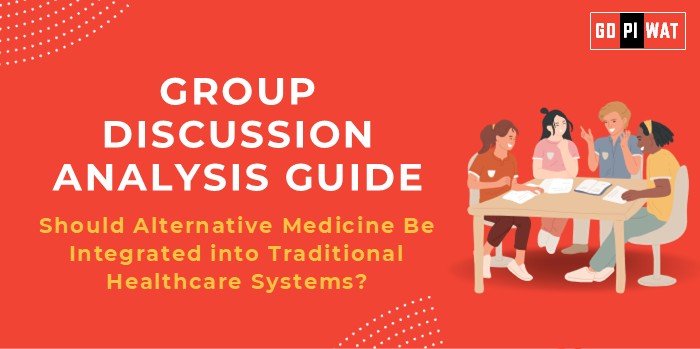📋 Group Discussion Analysis Guide
🌟 Topic: Should Alternative Medicine Be Integrated into Traditional Healthcare Systems?
🌐 Introduction
Opening Context: Healthcare systems worldwide are evolving to incorporate diverse treatment modalities to provide holistic care. Alternative medicine, such as Ayurveda, Homeopathy, and Acupuncture, has seen growing acceptance globally.
Topic Background: Alternative medicine has existed for centuries and is often rooted in traditional and cultural practices. While conventional medicine offers evidence-based solutions, alternative therapies often focus on preventive care and holistic healing. This integration could redefine patient care by combining the strengths of both systems.
📊 Quick Facts and Key Statistics
- WHO Reports: 88% of WHO member states recognize traditional medicine’s contributions to healthcare systems.
- Global Market Value: The global alternative medicine market is projected to reach $404 billion by 2028, growing at a CAGR of 22%.
- Ayurveda Usage in India: Over 77% of Indian households use Ayurveda at some level (Ministry of AYUSH).
- Patient Preference: Surveys indicate 59% of global patients favor integrative medicine for chronic diseases.
👥 Stakeholders and Their Roles
- Government Bodies: Frame regulations and invest in research and integration efforts.
- Healthcare Providers: Adapt practices to include integrative treatment options.
- Patients: Demand holistic care and improved access to alternative medicine.
- Pharmaceutical Companies: Develop validated formulations blending traditional and modern medicine.
🏆 Achievements and Challenges
✅ Achievements
- Increased popularity of Yoga and Ayurveda globally (UNESCO recognizes Yoga as an intangible cultural heritage).
- Proven efficacy in managing chronic conditions like arthritis and anxiety.
- Successful integration in countries like China, where TCM is widely used alongside conventional medicine.
⚠️ Challenges
- Lack of standardized practices and scientific validation.
- Regulatory challenges in harmonizing both systems.
- Potential misuse or over-reliance on unverified remedies.
🌍 Global Comparisons
- China: Successful integration of Traditional Chinese Medicine (TCM) with state healthcare.
- Germany: Insurance covers homeopathy, reflecting cultural acceptance.
📚 Case Study
India’s Ministry of AYUSH promotes research and integration, showcasing potential in medical tourism.
🔍 Structured Arguments for Discussion
- Supporting Stance: “Integrating alternative medicine can reduce healthcare costs and offer holistic care, especially for chronic diseases.”
- Opposing Stance: “Without rigorous scientific validation, integrating alternative medicine risks patient safety and erodes trust in healthcare.”
- Balanced Perspective: “While alternative medicine offers potential benefits, systematic integration requires evidence-based validation and strict regulations.”
✅ Effective Discussion Approaches
- Opening Approaches:
- Present global integration examples, such as TCM in China.
- Highlight patient-centric care models integrating alternative practices.
- Counter-Argument Handling:
- Use evidence (e.g., AYUSH studies) to validate safety concerns.
- Propose frameworks for quality assurance.
📈 SWOT Analysis
- Strengths: Cultural relevance, holistic care, affordability.
- Weaknesses: Lack of standardization, potential conflicts with evidence-based medicine.
- Opportunities: Medical tourism, chronic disease management.
- Threats: Misuse of unverified treatments, resistance from traditional healthcare practitioners.
🎓 Connecting with B-School Applications
- Real-World Applications: Opportunities in healthcare management, policy-making, and cross-disciplinary healthcare innovation.
- Sample Interview Questions:
- “What challenges do you foresee in integrating alternative medicine into public healthcare?”
- “How can alternative medicine enhance healthcare accessibility in rural areas?”
- Insights for Students: Research integration strategies, explore business models for wellness tourism, and assess policy implications.


